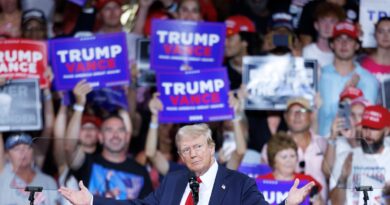Ex-DOJ employee who testified against Fugees rapper sentenced
George Higginbotham, 51, was not as well known as his co-conspirators, but his guilty plea in November 2018 in a cooperation deal with prosecutors helped bring down the curtain on what he admitted in plea papers was an illegal attempt by Low to shut down U.S. civil and criminal investigations into his alleged theft starting in the late 2000s of $4.5 billion from Malaysia’s sovereign wealth fund, known as 1MDB.
A second failed prong of the plot allegedly led by Low, who remains at large, was to persuade then-President Trump to extradite a wealthy Chinese national, Guo Wengui — a prominent critic of China’s government then living in New York — to China at the direction of Beijing authorities, all in exchange for about $100 million.
At a brief morning sentencing hearing in Washington, D.C., Higginbotham said he accepted “unmitigated responsibility” for his poor decisions and criminal conduct and apologized for the damage they caused the Justice Department and the people he loved.
“I lied to myself every step of the way … I broke the law, and I have no excuses,” Higginbotham told U.S. District Judge Colleen Kollar-Kotelly.
At a time of a “loss of faith” in the Justice Department and government institutions, the Fordham Law School graduate turned to federal prosecutors saying, “I should have been working with them to maintain the integrity of our system, not hurting it.”
Higginbotham, who worked as a senior congressional affairs specialist for the Justice Department from July 2016 to August 2018, pleaded guilty on Nov. 30, 2018, to one count of conspiracy to make false statements to a bank, and admitted to illicitly facilitating the transfer of tens of millions of dollars into the United States to finance the lobbying effort. Higginbotham admitted he attempted at Michél’s direction to open accounts at U.S. financial institutions to funnel in Low’s money, creating fake loan and consulting documents to deceive banks and regulators about the funds’ true source and purpose.
Prosecutors requested leniency and three months probation, saying Higginbotham was the first cooperator in the investigation, that he provided “expansive” and substantial assistance in securing the convictions of co-conspirators in multiple interviews for a year before his plea, and testified at Michél’s trial in Washington this spring. The Grammy-award winning musician awaits sentencing following his April conviction on 10 counts including money laundering, illegal lobbying, witness tampering and campaign finance violations, charges punishable by a statutory maximum of up to 20 years.
In sentencing Higginbotham, Kollar-Kotelly noted that he received a fraction of the money paid to others, had no direct involvement in unlawful efforts to lobby U.S. officials, and “was not the architect, engine or primary beneficiary” of the plot, according to prosecutors.
Michél kept about $80 million, Broidy was paid $9 million, and his associate, business executive Nickie Mali Lum Davis, was paid almost $11 million. Broidy and Davis separately pleaded guilty in 2020 to conspiring to violate the Foreign Agents Registration Act, known as FARA. Broidy was pardoned by Trump on his last day in office. Davis was sentenced in January to two years in prison.
Higginbotham, a former U.S. Agency for International Development employee who worked on vetting aid recipients on four continents, received $170,000, some of which was unrelated to the scheme. Still, Kollar-Kotelly said Higginbotham had a role in a serious offense of putting the interests of undeclared foreign principals above those of the United States.
She said she credited him with his early acceptance of responsibility, cooperation, genuine remorse and a blemish-free five years spent under supervision since his guilty plea, as well as support from his family and ongoing employment despite the suspension of his law license.
Those factors “go[] a great deal from the court’s perspective as to [showing] whether there’s going to be deterrence in the future” from Higginbotham committing future crimes. Kollar-Kotelly said. “I think there has been and will be deterrence,” she said, and “the need for others to be deterred is very important” as well.




